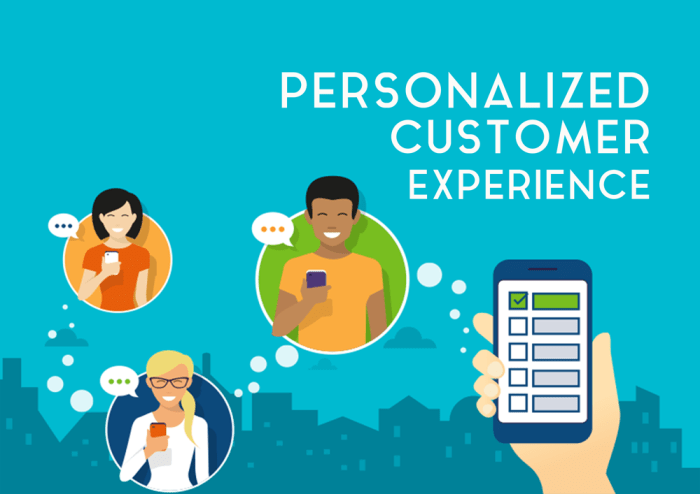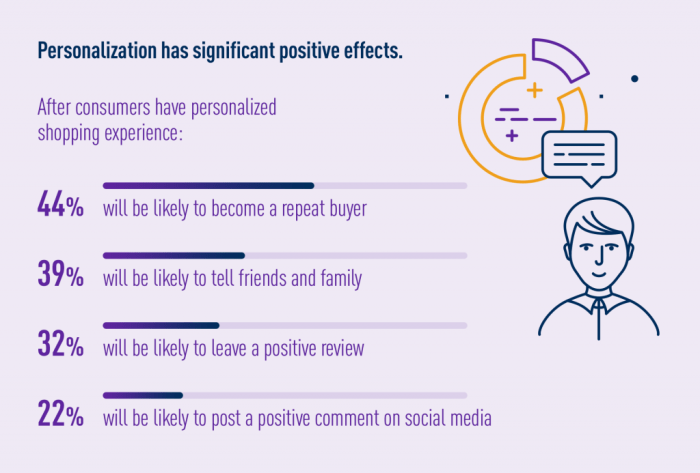Yo, get ready to dive into the world of Personalizing Customer Experiences where businesses level up by creating unique connections with their peeps. From defining the importance to exploring cutting-edge technologies, this ride is gonna be lit!
Let’s break down the strategies, tech, challenges, and solutions that shape the game of personalized customer experiences.
Definition and Importance of Personalizing Customer Experiences
Personalizing customer experiences in the business world means tailoring products, services, and interactions to meet the specific needs and preferences of individual customers. It involves using data and insights to create unique and memorable experiences that make customers feel valued and understood.
Personalized customer experiences are crucial for building brand loyalty and fostering long-term relationships with customers. By showing that you understand and care about their preferences, you can create a strong emotional connection that goes beyond just the transactional aspect of the relationship. This can lead to increased customer satisfaction, repeat business, and positive word-of-mouth referrals.
Companies Excelling in Personalizing Customer Experiences
- Amazon: The e-commerce giant uses data analytics to offer personalized product recommendations and customized shopping experiences based on past purchases and browsing behavior.
- Netflix: The streaming service uses algorithms to personalize content recommendations for each user, enhancing the viewing experience and keeping subscribers engaged.
- Starbucks: The coffee chain’s mobile app allows customers to customize their orders, earn rewards, and receive personalized offers and promotions based on their preferences and purchase history.
Strategies for Personalizing Customer Experiences
In today’s competitive market, businesses need to go the extra mile to create personalized experiences for their customers. By implementing effective strategies, companies can build stronger relationships with their clientele and increase brand loyalty.
Online vs. Offline Personalization
When it comes to personalizing customer experiences, businesses can utilize different strategies in both online and offline settings. Online personalization can include targeted ads based on browsing history, personalized email campaigns, and tailored product recommendations. On the other hand, offline personalization can involve in-store experiences, personalized interactions with sales representatives, and customized loyalty programs.
Successful Personalized Marketing Campaigns
1. Amazon: The e-commerce giant is known for its highly personalized recommendations based on a customer’s browsing and purchase history. This strategy has significantly contributed to Amazon’s success and customer retention.
2. Starbucks: The coffee chain utilizes its mobile app to offer personalized rewards and recommendations to customers, creating a more tailored experience both in-store and online.
3. Spotify: The music streaming service uses algorithms to create personalized playlists for users based on their listening habits, enhancing user engagement and satisfaction.
Technologies for Personalizing Customer Experiences

AI and machine learning play a crucial role in personalizing customer experiences by analyzing data and predicting customer behavior. These technologies enable businesses to tailor their interactions with customers based on individual preferences and past behaviors.
AI and Machine Learning, Personalizing Customer Experiences
AI algorithms and machine learning models are used to analyze customer data in real-time, allowing businesses to understand each customer’s preferences, shopping habits, and browsing history. By leveraging these technologies, companies can create personalized recommendations, targeted marketing campaigns, and customized product offerings that resonate with each individual customer.
Tools and Software
There are various tools and software available for businesses to personalize customer interactions, such as customer relationship management (CRM) systems, marketing automation platforms, and personalization engines. These tools help businesses collect and analyze customer data, segment their customer base, and deliver personalized experiences across various touchpoints.
Data Analytics
Data analytics plays a crucial role in creating personalized customer experiences by extracting valuable insights from customer data. Through data analytics, businesses can identify patterns, trends, and correlations in customer behavior, allowing them to make informed decisions on how to personalize interactions with customers. By leveraging data analytics, businesses can continuously optimize and improve the customer experience, driving customer loyalty and satisfaction.
Challenges and Solutions in Personalizing Customer Experiences

In the quest to provide personalized customer experiences, businesses often face various challenges that can hinder their efforts. However, with the right strategies and technologies, these challenges can be overcome to deliver exceptional customer experiences.
Common Challenges Faced by Businesses in Personalizing Customer Experiences
- Insufficient Customer Data: Many businesses struggle with collecting and analyzing enough data to truly understand their customers’ preferences and behaviors.
- Technology Limitations: Outdated or incompatible systems can make it difficult to integrate customer data and deliver personalized experiences across channels.
- Privacy Concerns: Balancing the need for personalized experiences with customer privacy concerns can be a delicate challenge for businesses.
- Scalability Issues: As businesses grow, maintaining personalized experiences for a larger customer base can become increasingly complex.
Proposed Solutions to Overcome Challenges in Delivering Personalized Customer Experiences
- Invest in Advanced Analytics: By leveraging advanced analytics tools, businesses can gain deeper insights into customer behavior and preferences.
- Implement Integrated CRM Systems: Integrated customer relationship management (CRM) systems can help businesses centralize customer data and deliver consistent experiences across touchpoints.
- Enhance Data Security Measures: By implementing robust data security measures and being transparent with customers about data usage, businesses can build trust while delivering personalized experiences.
- Automate Personalization Processes: Utilizing automation and AI technologies can help businesses scale personalized experiences efficiently and effectively.
Real-life Examples of How Companies Have Tackled Challenges in Personalization
- Amazon: Amazon uses advanced algorithms to analyze customer data and provide personalized product recommendations, enhancing the overall shopping experience.
- Netflix: Netflix leverages user behavior data to personalize content recommendations, keeping viewers engaged and satisfied with their streaming service.
- Starbucks: Starbucks’ mobile app uses customer purchase history to offer personalized rewards and recommendations, driving customer loyalty and engagement.





